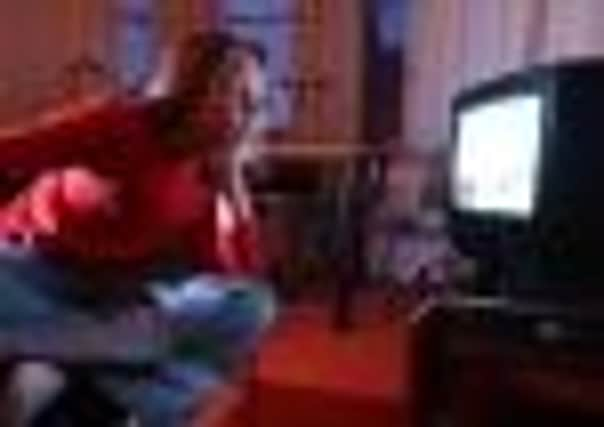Tiffany Jenkins: Plug in and turn on: it’s hip to be square-eyed


It’s a sure-fire way to commit social suicide, or ruin a reputation at least. I casually mentioned watching something on television, at a drinks party recently, and the person beside me smiled – clearly revelling in the moment of one-upmanship – before smugly saying: “We don’t have a TV.” Another nodded: “I am just too busy to watch it.”
Had it been the latest Booker Prize novel, art-house film or exhibition, I am pretty sure that they would have jumped at the chance of claiming they had read or seen it.
Advertisement
Hide AdAdvertisement
Hide AdFrankly, I didn’t believe them. If we are honest, most of us spend hours in front of the flickering screen. And yet it is the cultural form most derided, considered, at best, just light entertainment, a way to nod off on a Saturday night. At worst, it is portrayed as deadening the feelings. It is the “Drug of the Nation” after all, “Breeding ignorance and feeding radiation”, according to the band, the Disposable Heroes of Hiphoprisy. “Plug in, turn on, and cop out”, sung Gill Scott Heron.
But actually, right now, television is where some of the greatest dramatic, social commentary is on show. Far from lowbrow, the dramas of recent times – Breaking Bad, Homeland, Deadwood, Mad Men, The Wire, and Friday Night Lights, to name but a few are far better than any current novel or art work. And it’s not just American shows; the Scandinavians, with their crime and political dramas, are on a roll. I would go so far as to say that some of the greatest work – yes, art work – is on the box.
I am not watching the dross. There are plenty of shockingly bad programmes on multiplying channels. Reality television, the impact of Big Brother, and celebrity culture, has a lot to answer for. Overall the aspirations of broadcasters have lowered.
But in between the repeats, the formulaic and new detritus, there is a golden age taking place that deserves a spotlight. Certainly, there have been technical developments, and changes in format that have allowed programme makers more time, creating space for characterisation, and a plot that develops gradually rather than rushing to the conclusion after 45 minutes. Twin Peaks, about the murder of a schoolgirl in a strange but recognisable American small town, triggered this new approach in the 1990s. The story unfolded over two seasons, and involved film stars; both factors contributing to elevating it above the ordinary, as did David Lynch’s surreal touches.
Today, serious film directors like Todd Haynes, who made Far From Heaven, transfer to television with ease, where they have at least five hours instead of 90 minutes. Haynes directed the mini-series Mildred Pierce, starring Kate Winslet as a strong American housewife and mother trying to survive in the Depression. Martin Scorsese attempted something similar with Boardwalk Empire, starring Kelly Macdonald. And the box-set format, which means we can watch what we want when we want to, without the distraction of adverts, allows us to get carried away with a series, sometimes, admittedly, for months.
But there is more to it than top directors, stars and changes in format. The major success stories deal with big themes, mediating on responsibility, right and wrong, and the promise of what life could be, contrasted with the disappointment of how it ends up. Take a look at Breaking Bad, which has just started its fifth series in the US. The central character, Walter White, is complex. He is an everyday, disillusioned, chemistry teacher who finds out he has aggressive lung cancer. In the face of death, he does something that would appear out of character – he decides to manufacture the drug crystal meth, primarily so he can leave his family money, but also because when he does he becomes a stronger person, embarking on a desperate but rewarding life of crime.
The series subverts everything you have seen on television before, and manages, somehow, to raise serious questions about right and wrong, good and evil. Walt starts out a hero you root for, whose motivations you understand, and gradually turns into a cold villain from whom you recoil. But it is hard to work out when Walt crossed the line. Despite the unlikely plot, it feels realistic because it deals so well with struggle, disappointment, and failure. The conservative critic Matthew Arnold once described literature as “a criticism of life.” Referring to poetry in particular, and more generally high culture, he suggested that it should civilise and spiritually enrich people. It could replace these functions which religion had originally provided. Now, Mad Men isn’t going to replace the church. But it strikes me that what these programmes do so well is explore morality, either directly or opaquely. And in doing so, and doing it so well – these programmes are beautifully produced, acted, and filmed – there is a searing truthfulness that’s close to art.
The very fact that these TV series have stimulated so much talk, newspaper copy, and I expect numerous PhD theses, shows that they have hit a nerve, and that is important. That television has had an impact well beyond our living rooms is significant. I have talked about these characters; about what it all means, with a diverse group of friends and colleagues over time, discussing free-will, the social structures that limited the possibilities for people, and their character flaws.
Advertisement
Hide AdAdvertisement
Hide AdCrucially, this has not happened with novels we have read which only get a customary mention. Literature, though reasonably healthy, and still pervasive, seems tired and diminished in comparison.
So plug in, turn on, and don’t feel ashamed. If you are shunned socially, at least you know a good way to spend that free time.